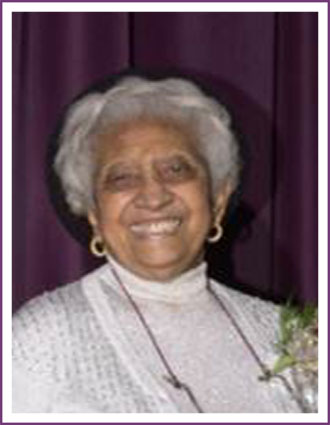MAHALA Norma (Ashley) DICKERSON

• Civil Rights
Inducted: 2009
Deceased: 2007
Wasilla
MAHALA Norma (Ashley) DICKERSON
It’s not uncommon for people to let their wanderlust take hold and embark on an adventurous trip to Alaska. Nor is it uncommon for many of those travelers to fall in love and make Alaska their home. One such traveler is the subject of today’s spotlight on Women’s History Month: Mahala Dickerson.
Mahala Dickerson achieved many “firsts” as she blazed a trail for Black women throughout her long and distinguished career. Born in rural Montgomery County, Alabama, in 1912, she was sent to a private school where she began a lifelong friendship with Rosa Parks, who would become a hero of the civil rights movement in her own right. After graduating cum laude from Fisk University in 1935, she married, raised triplets and in 1945, graduated from Howard University Law School. Dickerson returned to Alabama, where she became the first Black female lawyer in the state in 1948. She later moving to Indiana and became only the second Black woman to be admitted to the bar in 1951.
But it was a vacation to Alaska that first endeared her to the landscape and natural beauty. After a brief return to Indiana, Dickerson decided to make the move north. She filed a claim for a 160-acre homestead in the Matanuska-Susitna Valley near Wasilla in 1958, but her right to fill out a homestead application was at first denied. She was later able to file a successful claim and became Alaska’s first female Black Homesteader.
A few months later, Dickerson passed the Alaska Bar exam and became the first black lawyer in Alaska. She soon opened her law practice in Anchorage, where she had many courtroom victories across a fifty-year career and made a strong impact on women’s rights and civil rights.
Perhaps her most notable trial, Dickerson argued and won a precedent-setting equal pay case for female faculty members at the University of Alaska, who received less pay their male counterparts.
She was known for her passionate defense of her clients, advocating for women, the poor, and minorities that would become a hallmark of her legal career. She accepted many pro bono cases and served as a mentor to many attorneys of color.
Her fierce defense of the needy became her reputation.
‘I have described myself as attorney for the hopeless, borrowing the title from a book I once read on the life of Clarence Darrow in which he was described as ‘Attorney for the Damned,’” she once wrote.
Attorney Rex Butler, whom Dickerson persuaded to come to Anchorage, best encapsulated her career as a successful litigator in this recollection, “I remember one lawyer telling me one time, he said, ‘Rex, you see those mountains out there? Those mountains are littered with the bones of lawyers who underestimated M. Ashley Dickerson.”
While Dickerson is most widely known for her legal prowess, she was also a ground-breaking homesteader. Back in 1959, to claim a homestead, one had to build a cabin and be growing your own food on the land within two years. She did that while opening her law practice.
It is that homestead and Dickerson’s dream of creating a Quaker center that stemmed in part from time she spent in Wallingford, Pennsylvania, studying with the Quakers in the summer of 1950, which she called “one of the most inspiring experiences of my life.”
She later donated he 11 acres from her homestead to what is now called the Alaska Friends Conference.
Her list of accolades was as distinguished as her career. In 1983 Dickerson was the first African American to be elected president of the National Association of Women Lawyers. In 1985, she received both the Zeta Phi Beta Ward for distinguished service in the field of law and the Baha’i Award for Service to Humanity. In 1995 the American Bar Association named her a Margaret Brent Women Lawyers of Achievement honoree. She also wrote a book about her life, Delayed Justice for Sale.
Dickerson, the pioneering African-American lawyer passed away in 2007 at the age of 94, after suffering a stroke. She is still remembered for the trail she blazed, not often taken by black women, her life spanning decades of struggle and progress.
Written by Katie Stavick, Frontiersman
